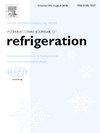Study on the energy performance of a multi-mode split evaporative-cooling hybrid air-conditioning system
IF 3.5
2区 工程技术
Q1 ENGINEERING, MECHANICAL
International Journal of Refrigeration-revue Internationale Du Froid
Pub Date : 2025-03-16
DOI:10.1016/j.ijrefrig.2025.03.022
引用次数: 0
Abstract
Reducing energy consumption in buildings is a crucial component in the pursuit of carbon neutrality and sustainable social development. The air-conditioning systems account for a significant portion of a building's energy consumption and therefore require special attention to their energy efficiency. These air-conditioning systems that incorporate indirect evaporative cooling (IEC) technology are a viable energy-saving strategy. However, these hybrid systems are mainly designed for hot-dry climates, and limited research has focused on the coupling advantages of condenser pre-cooling and reheating energy recovery via IEC through different operating modes. In this paper, a novel multi-mode split evaporative-cooling hybrid air-conditioning system (MVC-IEC) is proposed, which utilizes the IEC cycle to achieve condenser pre-cooling and supply air reheating. Simultaneously, it features five operating modes to adapt to the changing ambient climatic conditions. Subsequently, the energy performance of the MVC-IEC system was primarily investigated under different operating conditions. The MVC-IEC demonstrates a more pronounced energy-saving advantage under high temperature, medium-low humidity and low reheat load conditions. In addition, the MVC-IEC has acceptable application potential in both hot-humid and hot-dry cities (Changsha, Nanjing, Zhengzhou and Xi'an). The seasonal COP for the MVC-IEC is reached by 3.9 − 4.6. And compared with MVC![]() HRC, the MVC-IEC achieves an energy-saving rate of 10.8 − 16.3 % and reduces carbon emissions by 0.42−0.80 kg/year.
HRC, the MVC-IEC achieves an energy-saving rate of 10.8 − 16.3 % and reduces carbon emissions by 0.42−0.80 kg/year.
求助全文
约1分钟内获得全文
求助全文
来源期刊
CiteScore
7.30
自引率
12.80%
发文量
363
审稿时长
3.7 months
期刊介绍:
The International Journal of Refrigeration is published for the International Institute of Refrigeration (IIR) by Elsevier. It is essential reading for all those wishing to keep abreast of research and industrial news in refrigeration, air conditioning and associated fields. This is particularly important in these times of rapid introduction of alternative refrigerants and the emergence of new technology. The journal has published special issues on alternative refrigerants and novel topics in the field of boiling, condensation, heat pumps, food refrigeration, carbon dioxide, ammonia, hydrocarbons, magnetic refrigeration at room temperature, sorptive cooling, phase change materials and slurries, ejector technology, compressors, and solar cooling.
As well as original research papers the International Journal of Refrigeration also includes review articles, papers presented at IIR conferences, short reports and letters describing preliminary results and experimental details, and letters to the Editor on recent areas of discussion and controversy. Other features include forthcoming events, conference reports and book reviews.
Papers are published in either English or French with the IIR news section in both languages.

 求助内容:
求助内容: 应助结果提醒方式:
应助结果提醒方式:


